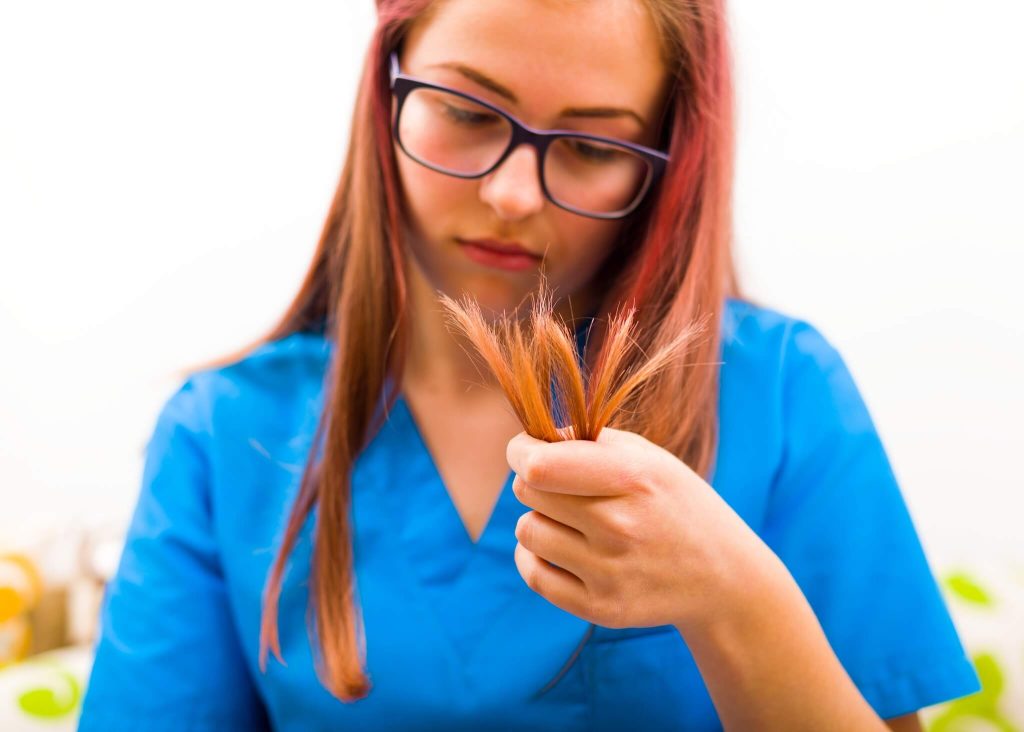Hair loss can be concerning at any age, but it can be particularly distressing when you’re a teenager. Adolescence is a time of change, and understanding why hair loss might occur during this period can help alleviate worries and find appropriate solutions. In this blog, we will explore the question about “Why is My Hair Falling Out as a Teenager?”.
Common Causes of Hair Loss in Teenagers
Hair loss can affect teenagers due to a variety of factors, ranging from genetic predispositions to lifestyle and health conditions. Understanding these causes is crucial for identifying the underlying issue and exploring appropriate treatment options.
1. Genetics – Family history plays a significant role in hair loss patterns. Teenagers may inherit genes that predispose them to conditions like androgenetic alopecia (male or female pattern baldness), which can manifest during adolescence due to hormonal changes.
- Symptoms: Gradual thinning of hair around the temples or crown.
- Treatment: Genetic predisposition may require ongoing management, including medications like minoxidil, under the guidance of a healthcare provider.
2. Hormonal Changes – Puberty triggers fluctuations in hormone levels, affecting both males and females differently. Increased androgens in males and changes in estrogen levels in females can disrupt the hair growth cycle, leading to conditions like telogen effluvium (temporary hair shedding) or hormonal imbalances such as polycystic ovary syndrome (PCOS).
- Symptoms: Sudden hair shedding, noticeable thinning, or irregular menstrual cycles in females with PCOS.
- Treatment: Hormonal treatments or birth control pills (for PCOS) prescribed by a doctor can help regulate hormone levels and improve hair growth.
3. Health Conditions – Certain medical conditions, such as thyroid disorders or autoimmune diseases like alopecia areata, can lead to hair loss in teenage girls and boys.
- Symptoms: Patchy hair loss (alopecia areata), dry or brittle hair (thyroid disorders).
- Treatment: Consultation with a healthcare provider for proper diagnosis and treatment, which may involve medication to manage underlying conditions affecting hair health.
4. Nutritional Deficiencies – Poor dietary choices can result in deficiencies of essential nutrients vital for healthy hair growth, such as proteins, vitamins (especially vitamin D and vitamin C), and minerals (like iron and zinc).
- Symptoms: Brittle hair, hair thinning, or changes in hair texture.
- Treatment: Improving nutrition through a balanced diet rich in proteins, fruits, vegetables, and whole grains. Supplements may be recommended to address specific deficiencies under medical supervision.
5. Stress and Lifestyle Factors – Teenage years can be stressful due to academic pressures, social challenges, or body image concerns. Chronic stress can disrupt the hair growth cycle, while habits like overstyling (excessive use of hair products, heat tools) or trichotillomania (hair pulling disorder) can damage hair follicles.
- Symptoms: Hair breakage, hair loss in localized patches (trichotillomania).
- Treatment: Stress management techniques, counseling for behavioral disorders like trichotillomania, and adopting gentle hair care practices to minimize damage.
6. Traction Alopecia – Constantly styling hair in tight hairstyles (braids, ponytails) that pull on the scalp can cause gradual hair loss around the hairline.
- Symptoms: Receding hairline or thinning along the edges of the scalp.
- Treatment: Avoiding tight hairstyles, allowing the scalp to rest, and using protective styles that do not exert tension on the hair follicles.
Understanding these common causes of hair loss in teenagers is essential for promoting healthy hair care practices and maintaining self-esteem. Consulting with a healthcare provider or dermatologist can provide personalized guidance on identifying the specific cause and exploring effective treatment options tailored to individual needs.
What You Can Do About It
Experiencing hair loss as a teenager can be distressing, but there are proactive steps you can take to manage and potentially improve the condition of your hair:
1. Consult a Healthcare Professional – If you notice significant hair loss or thinning, it’s essential to seek guidance from a healthcare provider or dermatologist. They can help identify the underlying cause and recommend appropriate treatments or lifestyle adjustments.
2. Address Nutritional Deficiencies – Ensure your diet includes a variety of nutrient-rich foods. Focus on proteins (like lean meats and nuts), vitamins (especially vitamin D and vitamin C), and minerals (such as iron and zinc), which are essential for healthy hair growth. Supplements may be recommended if deficiencies are identified.
3. Manage Stress – Hormonal fluctuations and life changes during adolescence can contribute to stress, which may impact hair health. Practice stress-reducing activities such as yoga, meditation, or hobbies that you enjoy. Adequate sleep and regular exercise can also help manage stress levels, positively impacting hair growth.
4. Adopt Gentle Hair Care Practices – Avoid overstyling your hair with heat tools (like curling irons or straighteners) and harsh chemicals (such as perms or dyes). Use a mild shampoo and conditioner suitable for your hair type, and consider limiting the frequency of washing to prevent stripping natural oils.
5. Treat Underlying Health Conditions – If hair loss is associated with a medical condition like thyroid disorders or hormonal imbalances (such as polycystic ovary syndrome – PCOS), follow your healthcare provider’s recommendations for managing these conditions. This may involve medications or lifestyle adjustments.
6. Avoid Tight Hairstyles – Avoid haircuts that pull on the roots of your hair, such as tight ponytails, braids, and extensions. Choose relaxing styles that reduce strain on the scalp and improve circulation.
7. Consider Medical Treatments – Depending on the underlying cause of your hair loss, your healthcare provider may recommend treatments such as minoxidil (an over-the-counter medication) or prescription medications like finasteride to promote hair regrowth.
8. Seek Psychological Support if Needed – Hair loss can impact self-esteem and emotional well-being, especially during adolescence. If you’re struggling with feelings of distress or low self-confidence, consider talking to a counselor or therapist who can provide support and coping strategies.
9. Monitor Hair Growth and Changes – Keep track of any changes in your hair growth patterns or condition. This information can be valuable during consultations with healthcare providers to assess treatment effectiveness and make adjustments as needed.
By taking these proactive steps, you can empower yourself to address and potentially improve hair loss during your teenage years. Remember that each person’s experience with hair loss is unique, so personalized advice from healthcare professionals is crucial for effective management.
Treatment Options for Teenage Hair Loss
When dealing with hair loss, it’s important for teenagers to explore various treatment options that address the underlying causes and promote healthy hair growth. Here are some effective treatment options:
1. Nutritional Adjustments – Ensuring a well-balanced diet rich in essential nutrients can significantly improve hair health. Key nutrients include:
- Iron: Found in red meat, leafy greens, and legumes.
- Zinc: Present in nuts, seeds, and dairy products.
- Vitamins: Particularly vitamins A, D, and B-complex (like biotin), which are found in fruits, vegetables, eggs, and fish.
- Proteins: Vital for hair structure, sourced from lean meats, beans, and nuts.
- Minerals: Such as magnesium and calcium, found in dairy products and leafy greens.
2. Medical Treatments – Depending on the underlying cause of hair loss, medical treatments may be necessary:
- Minoxidil: An over-the-counter topical treatment that can help stimulate hair growth and slow down hair loss.
- Finasteride: A prescription medication typically used for male pattern baldness; not commonly prescribed for teenagers but can be considered in some cases under a doctor’s supervision.
- Hormonal Treatments: For conditions like polycystic ovary syndrome (PCOS), birth control pills or other hormonal therapies may help balance hormone levels and reduce hair loss.
3. Stress Management – Chronic stress can lead to conditions such as telogen effluvium, where stress disrupts the hair growth cycle. Effective stress management techniques include:
- Exercise: Regular physical activity helps reduce stress levels and promote overall well-being.
- Mindfulness and Meditation: Practices like yoga and meditation can help manage anxiety and improve mental health.
- Counseling and Support: Talking to a therapist or joining support groups can provide emotional support and coping strategies.
4. Scalp and Hair Care – Proper hair and scalp care can prevent further hair loss and promote regrowth:
- Gentle Hair Products: Use mild shampoos and conditioners suited to your hair type to avoid irritating the scalp.
- Avoid Overstyling: Limit the use of heat styling tools and harsh chemical treatments.
- Healthy Hair Practices: Regularly massage the scalp to improve blood circulation and promote hair growth.
5. Medical Intervention for Health Conditions – If hair loss is due to underlying health issues, such as thyroid disorders or autoimmune diseases (e.g., alopecia areata), appropriate medical treatment is necessary:
- Thyroid Medication: Treating hypothyroidism or hyperthyroidism with the right medication can help restore hair growth.
- Autoimmune Treatments: For conditions like alopecia areata, treatments may include corticosteroids or other immunosuppressive medications.
6. Behavioral Therapy – For hair loss due to trichotillomania (hair-pulling disorder), behavioral therapy can be beneficial:
- Cognitive Behavioral Therapy (CBT): Helps address the urge to pull hair and develop healthier coping mechanisms.
- Support Groups: Connecting with others who have similar experiences can provide comfort and shared strategies.
7. Professional Consultation – Regular visits to a dermatologist or hair specialist can help monitor the condition and adjust treatments as needed. They can provide personalized advice and advanced treatments such as laser therapy or PRP (platelet-rich plasma) therapy.
By exploring these treatment options, teenagers can take proactive steps to manage hair loss and improve hair health. It’s important to consult with healthcare professionals to identify the most suitable approach based on individual needs and underlying causes.
Conclusion
Hair loss during teenage years can be distressing, but it’s essential to understand that it’s often treatable once the underlying cause, such as hormonal imbalances or vitamin deficiencies, is identified. By taking steps to improve nutrition, manage stress, and adopt gentle hair care practices, you can promote healthier hair growth and regain confidence in your appearance.
If you have concerns about your hair health, don’t hesitate to reach out to a healthcare professional who can provide personalized guidance and support. Whether it involves dietary adjustments, hormonal treatments like finasteride or birth control pills for conditions like PCOS, or topical treatments such as minoxidil, there are effective treatment options available.
Remember, hair regrowth can take time, and consistency in following treatment recommendations is key. It’s also important to address any underlying health conditions contributing to hair loss and to prioritize your overall well-being. With the right support and guidance from experts, you can take proactive steps towards managing hair loss and maintaining healthy hair growth throughout your teenage years and beyond.
Frequently Asked Questions (FAQs)
Here are some FAQs about Hair Falling Out as a Teenager:
Q. How does hormonal imbalance contribute to hair loss in teenagers?
Hormonal imbalance during puberty can disrupt the natural hair growth cycle by increasing levels of androgens (male hormones) or altering estrogen levels in girls. This imbalance can shorten the hair’s growth phase (anagen phase) and lead to premature shedding or thinning of hair follicles. Conditions like androgenetic alopecia or polycystic ovary syndrome (PCOS) may exacerbate hair loss due to hormonal fluctuations in teenagers.
Q. How can stress affect hair loss in teenagers?
Stress can disrupt the hair growth cycle in teenagers by triggering hormonal changes, such as increased levels of cortisol, which can lead to hair shedding. Chronic stress may also exacerbate underlying conditions like alopecia areata or telogen effluvium, contributing to noticeable hair loss. Managing stress through relaxation techniques and healthy coping mechanisms is crucial for maintaining hair health during adolescence.
Q. How does poor nutrition impact hair loss in teenagers?
Poor nutrition in teenagers can impact hair loss by depriving hair follicles of essential nutrients like iron, zinc, and vitamins (especially B vitamins and vitamin D) necessary for healthy growth. A deficiency in these nutrients can weaken hair strands, leading to increased shedding and slower regrowth. Ensuring a balanced diet rich in these nutrients can help support optimal hair health and minimize the risk of hair loss.
Q. Can certain hairstyles or hair products contribute to teenage hair loss?
Yes, hairstyles that apply persistent strain to the hair follicles, such as tight ponytails or braids, can contribute to teenage hair loss by inducing traction alopecia. Overuse of harsh chemical-containing hair products, as well as regular heat styling, can damage the hair shaft, resulting in breakage and thinning. Using gentler style methods and products tailored to your hair type can help reduce these hazards.
Q. Are there any natural remedies for treating teenage hair loss?
Yes, natural remedies for treating teenage hair loss include maintaining a balanced diet rich in essential nutrients like iron, zinc, vitamins (especially vitamin D and vitamin C), and proteins. Additionally, managing stress through activities such as yoga, meditation, and regular exercise can help improve hair health. Gentle hair care practices, such as avoiding overuse of heat styling tools and harsh chemical treatments, can also support hair growth.
Q. How can I prevent or reduce hair loss as a teenager?
To prevent or reduce hair loss as a teenager, maintain a balanced diet rich in essential nutrients like iron, zinc, and vitamins, practice gentle hair care by avoiding excessive heat styling and harsh chemical treatments, and manage stress through activities such as exercise, meditation, and adequate sleep. Additionally, keep your scalp healthy and consult a healthcare professional for any underlying health conditions or hormonal imbalances. Regular trims and staying hydrated can also contribute to healthier hair growth.
Q. Is it possible for nutritional deficiencies to cause hair loss in teenagers?
Yes, nutritional deficiencies can cause hair loss in teenagers. Lack of essential nutrients like iron, zinc, and vitamins (especially vitamins D and B) can weaken hair follicles and disrupt the hair growth cycle. Ensuring a balanced diet rich in these nutrients is crucial for maintaining healthy hair.
Discover Expert Guidance on Teenage Hair Loss at Neograft Hair Restoration Orange County
Are you troubled by unexpected hair loss during your teenage years? At Neograft Hair Restoration Orange County, we specialize in understanding and addressing the causes of hair loss in adolescents. Our team of skilled hair transplant experts in Orange County, California is here to provide comprehensive guidance tailored to your specific concerns about “Why is My Hair Falling Out as a Teenager?” Whether you’re exploring nutritional strategies, stress management techniques, or advanced hair restoration treatments, we offer personalized solutions to help you regain confidence in your hair’s health.
Take charge of your hair journey today—contact us to schedule a consultation and discover how we can assist you in achieving healthier, fuller hair!















Recent Comments